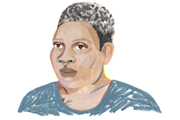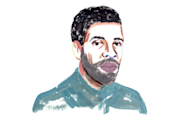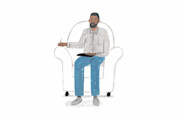You’ve poured your heart out to your therapist.
She knows your fears and your hopes and your bitterest regrets. She knows the secrets that not even your best friend knows.
And here she is in the supermarket comparing two brands of toilet paper.
Seeing your counselor outside of the familiar context of their office can be a shock to your system, and not the kind of thing etiquette class prepares you for.
Sometimes, it’s excruciatingly awkward, as it was for Louis*—who walked away quickly when he saw his therapist in line for the bathroom at Carnegie Hall.
“There was a nano-second meeting of the eyes,” before he darted back to his seat, and he made a mental note to never return to Carnegie Hall unless it was for an event his therapist would never attend.
For others, like Nick*—it’s a lot less fraught.
“I just said hi!” when he saw his therapist at an office party. “We hugged. It didn’t bother me. I trust her with my life.”
While there’s no absolute “correct” way to handle running into your trusted counselor at the carwash or in the drug store, there are some things to keep in mind to keep the experience as un-awkward—or at least as uneventful—as possible.
Do therapists say hi in public?
Your counselor is on your side, and that doesn’t change just because you’re both at the farmer’s market on Sunday morning.
If you make eye contact with your therapist and immediately avert your eyes or head for the exit, you don’t have to worry that they’ll greet you like an old friend. They’ll mirror your behavior by pretending not to notice you.
They’ll even follow your lead when it seems...weird.
“I was literally in front of a client,” recalls Dr. Jackson* (an LA-based psychologist), “and she didn’t see me somehow. It happened twice with the same person. She would say that she couldn’t handle seeing me outside the office. So she just didn’t.”
On the other hand, if you find yourself saying: “Hey, Dr. Jackson! How’s it going?” It’s more likely than not that they’ll indulge in some small talk.

Talking to your therapist outside of therapy
If you decide you want to say hello to your therapist when you see them in public, keep it short and sweet.
It’s acceptable to mention that big storm last night or how much you love this coffee shop’s lattes, but it’s absolutely not okay to bring the work you’re doing in your therapist’s office out into the world. Don’t tell them about your progress in trying to be mindful, don’t tell them how you followed their advice and stood up to a bully at work.
Even though you discuss personal matters, you and your therapist don’t have a personal relationship—you have a professional one.
You wouldn’t ask your dermatologist to look at the rash on your back or your hairdresser to give you a trim in the middle of the sidewalk. Extend the same courtesy to your therapist.
Moreover, if your therapist is with their partner or their children, don’t expect to be introduced, and don’t introduce anyone you may be with.
Brendan* recalls an especially uncomfortable evening when he took a date to a movie only to sit right next to his therapist...who was also on a date.
They said hi “super awkwardly,” and he introduced his date. His therapist smiled and returned her attention to the screen. (She did not introduce her date.)
Even though you discuss personal matters, you and your therapist don’t have a personal relationship—you have a professional one.
Good therapists have strong boundaries and want to share very little of their personal lives. This ensures that the focus of your conversations is you and it also cements your roles to each other.
Remember they’re human (And it’s awkward for them, too!)
If your counselor seems flustered and disoriented at the sight of you outside the office, it’s not a judgment on you or how you make them feel.
As weird as it is for you, it’s exponentially weirder for them.
They’re probably trying to do a half dozen mental calculations all at once: Which client is this? How is this client likely to act in this situation? Does that person with my client know what our relationship is?
All of these factors have to be considered simultaneously, so don’t take it personally if your therapist tries to get out of the conversation immediately.

Your counselor’s not being rude if they don’t say hi
Beyond trying to excuse oneself from the situation, it’s possible your therapist will straight-up ignore you.
This is more likely to happen if your counselor subscribes to analytic schools of thought in which the relationship between client and analyst literally only exists in the office where the work happens.
As weird as it is for you, it’s exponentially weirder for them.
The office is an element of what’s known as the “therapeutic frame,” which includes all the conditions of your work together, especially the environmental (the office, the sofa, the duration of the session etc.).
In fact, some therapists will pretend they don’t even know a current or former client outside the therapeutic frame.
Discuss it together beforehand
One of the first conversations to have with any new therapist is about the specifics of the framework of your unique relationship. This includes details like billing, scheduling, penalties for missing appointments, and so on.
You might want to include “How should I act if I see you in public?” to the list of topics to cover in initial meetings with your therapist.
It may be awkward to run into your therapist who knows you more intimately than anyone, in public. But, when it comes down to it, it’s really not a big deal.
We’re all just people.
And if you’re still paralyzed by doubt—just walk away. Your therapist won’t be offended.
READ NEXT: 9 Therapy Words People Often Use Wrong
(*Names have been changed)
Need to find a therapist near you? Check out the SimplePractice Monarch Directory to find licensed mental health therapists with availability and online booking.
Hyman, S. M. (2002). The shirtless jock therapist and the bikini-clad client: An exploration of chance extratherapeutic encounters. In A. A. Lazarus & O. Zur (Eds.), Dual relationships and psychotherapy (p. 348–359). Springer Publishing Co.
Knox, R., & Cooper, M. (2015). The Therapeutic relationship in counselling and psychotherapy. Los Angeles: SAGE Publications Ltd.














